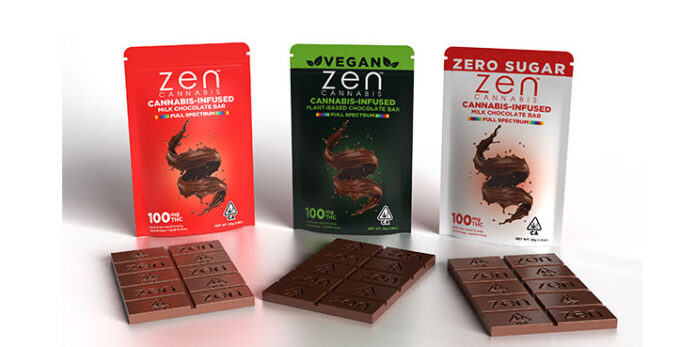Whether cannabis consumers fancy a piece of infused chocolate or a yummy gummy, the edibles market is exploding. In fact, the cannabis edibles market size was valued at $8 billion in 2022 and is estimated to observe around 16.5% CAGR from 2023 to 2032.
Zen Cannabis aims to capitalize on this booming industry with their extensive line of edibles. Previously focusing on a variety of gummy options, the brand now offers milk, zero sugar and vegan chocolate bars in California, Massachusetts, Missouri and Oklahoma. Availability in Arizona and New Mexico is soon to come.
“In every market, we’re trying to fill a void,” says Zen Cannabis’ Senior Projects Manager Lisa Swift. “The U.S. market for flower, vapes, etc. is highly saturated. Rather than spread ourselves thin, we prefer to be hyper-focused on doing a few things and doing them very well. That’s one of the things that allows us to deliver a superior product.”
Zen Cannabis Born Out of a Passion for the Plant
As with most cannabis businesses, Zen Cannabis came to fruition through a passion for marijuana. The founder, Jeremy Zachary, was involved in cannabis manufacturing and distribution for many years before launching the company, according to Swift.
“Zen was really born out of the ashes of a failed partnership and driven by a desire bred by Jeremy’s own personal experience with the therapeutic benefits of cannabis,” explains Swift. “His father was diagnosed with stage 4 cancer and Jeremy introduced him to cannabis to improve his quality of life in his remaining months.”
However, along this journey, they struggled with finding products that were both consistent and effective. When Zachary realized this void in the market, he set out to launch Zen Brands with a priority of delivering reliable and effective products at an accessible price point, according to Swift.

The Road to Multi-State Distribution
Zachary launched Zen Cannabis in 2019 in Oklahoma. Aside from the other states the brand eventually rolled out into, their products are also available in 26 countries in Europe. Swift says the process of expanding into other states and countries is the result of two key factors: relationships and efficiency.
“Over the years, we’ve really honed our manufacturing process, allowing us to be very cost-effective when setting up production lines in other locales,” notes Swift. “In other cases, we leverage our reputation of professionalism and reliability to build trusted relationships with manufacturers who share our values.”
When it comes down to expanding into any market, the success truly comes down to trust. You have to be able to build trust with both your consumers and also the other players in the market.
“Our goal is to expand into two new markets every year. Our next launch will be in New Mexico and we have numerous others in the works,” Swift says.
Ensuring Regulatory Compliance in Multiple Countries
Marijuana laws and guidelines are confusing enough as it is in the U.S., let alone selling in different countries in Europe. In order to keep Zen Cannabis afloat and selling legally, Swift attributes their success to a team of compliance experts who are constantly keeping abreast of new and challenging laws through reading, research and relationships.
“The relationships piece is really a key component,” explains Swift. “Our team does great work in building relationships with government officials and legislators. In some cases, they’ve even been able to be a part of the legislative process, advising officials on how to develop cannabis regulations that are fair to players in the industry and also protect the consumer.”
While there are 24 states in the U.S. that have legalized recreational marijuana, in Europe, the vast majority of countries still consider recreational use illegal, though some don’t prioritize enforcement. So the focus of the market out there is on medical use, according to Swift.
“Additionally, they have different regulations as far as what is considered cannabis versus hemp,” she says. “The sale of hemp is legal, and in Switzerland, for example, a plant can contain up to 1% THC and still be considered hemp. In other countries, it is 0.2% and in the U.S. that limit is 0.3%. So while there are differences in the regulations, the importance of compliance remains the same in any country.”
Looking toward the future, Swift sees nothing but growth for the cannabis industry.
“Every year more states are legalizing adult recreational use and I do see a future where one day it may be legal on a national level,” she states. “However, I do see a healthy contraction coming in some markets. Some areas are oversaturated and the brands that aren’t 100% committed to quality, consistency and regulatory compliance are going to have a hard time maintaining profitability to keep their doors open.”










